How much is enough for retirement??
ldstarr
8 years ago
Featured Answer
Comments (8)
randy427
8 years agoRelated Discussions
How much urine is enough - or too much?
Comments (7)Experiment. Pick a couple volunteer plants and keep adding more and more until they can't take it any more. Plants can typically take and like much more than you'd expect. You probably cannot add too much if it is diluted. Took me 2 cups of undiluted poured right at the stem of a 1' tall tomato plant to kill it. when I poured the same amount 1 foot away the plant enjoyed it....See MoreHow much land do you have and is it enough?
Comments (36)I'll chime in here as the Grinch, I guess. Although I'm married, I do all the gardening and the majority of the home maintenance, including all the financial/investing decisions. Also about 99% of the driving, too! I like doing all those things, so it's no big deal. We have a 1/6 acre urban lot and landscaped it into a very nice assortment of cottage-like, separate garden beds broken up by useful hardscape (2 patios and large storage shed/lanai). We both retired early, and gardening is my exercise. Weeding 2000 sq. ft. by hand, up and down hill, means I always have a bottle of Aleve in the medicine chest, LOL. It's beautiful and fun, but frankly, when we sell this property in oh, five to seven yrs from now, all I'll miss is being able to pick fresh Meyer lemons year-round. We've already investigated a number of senior communities and will pick one to move into after this place. No upkeep, no fuss, 24/7 med techs on site, and able to walk out, lock the door, and go traveling without worrying about the house being empty. If I want to keep gardening, there are community gardens all around that are begging for volunteers. My spouse had a major stroke at 50. I won't live more than 15 minutes drive from our HMO hospitals. He wouldn't be alive today if I hadn't been able to get him into emergency in 10 minutes flat (and that was at the height of rush hour!). We both love living in the city. We've got great neighbors and an incredible variety of friends. So much to do, so much to see, and since we both retired early, all the time to enjoy it. No kids and I even gave up pets a few years ago. Too much hassle and lots of $$$ as they aged and needed (expensive) care. Our neighbors/friends have pets; if we want to pet a dog or cat, we can pet theirs and not have to pay the food and vet bills. We never made as much $$$ as others we knew, so had to make decisions about what we wanted and what we can afford. We decided we wanted to spend time on the things we enjoy: a lot of books, great food (whether I make it at home or we dine out, which we do very often), a comfy home and a lot of good friends whom we see as often as possible. Even our modest urban property is a lot of work to handle for one person. Taking care of more RE wasn't how we wanted to enjoy our free time, especially as we age. Living in the city gives us an amazing breadth of choices - not just where to eat but where to live and how. As we have watched our older friends age, we see how more and more, they are simplifying their lives down to the activities they truly enjoy and the people they most want to spend time with. To us, that doesn't include sticking expensive pills down a sick animal's throat or being 85 yrs old and trying to hunch over to weed a 50' long flowerbed that is only one of fifteen others needing attention. Now, if others are up to it, I think that's wonderful! More power to them, I say. But that's not for me or my spouse. Ten years from now I want to have even more time for enjoying life with friends and family, not less. We want to create more shared memories with the people we love, not make it harder to do so....See MoreHow much is enough for new computer as far as processor HD, GB et
Comments (14)You are probably right about ME but whatever the reason it was a major headache. We kept 98 on our old computer until its demise a few years ago. Our other computer was 2000 and I didn't upgrade until XP2. For a non-tech, my workday is spent on my computer. I don't have time, nor knowledge to spend getting my computer to work nice with my software and settings, nor the funds to hire a tech. It took many hours to get everything working the way I needed and wanted. When I sit down at the machine, I need it to do what I want as my day is busy. My computer is networked with my other computer they work well together. I use remote connections from home and can work from here. XP is agreeable and familiar. It is so much more than 98 was. I remember all the 'restarts' and love the stability of XP. I think if I had gone from 98 straight to Vista I probably would enjoy Vista, although what I have seen and read about Vista doesn't inspire me enough to change. I hate MS Office 07. It was forced on me when I purchased this machine a year ago. Why they made the changes they did make no sense. It is non-intuitive and confusing to use. I have decided to stop using it and do all my work on my machine at work which still has 03. I can't express how angry I get each time I need to type a letter on 07. Hate it! At my age, I find computers frustrating enough, and don't want to add to it. I'll wait a few years, Jane...See MoreBrutal Heat out of the Blue, How much water is enough?
Comments (54)zt you can't show videos when they are private. Private setting is for your viewing only. You need to set it to either public so it is available to everyone, or you can choose unlisted. With unlisted, only people who you send the video link to can see it. Since you embedded them here we should be able to see them in unlisted mode. If you don't care who sees them then just make them public and resave....See Morejakkom
8 years agolast modified: 8 years agojn3344
8 years agolast modified: 8 years agosherwoodva
8 years agomaifleur01
8 years agojakkom
8 years agoldstarr
8 years ago
Related Stories
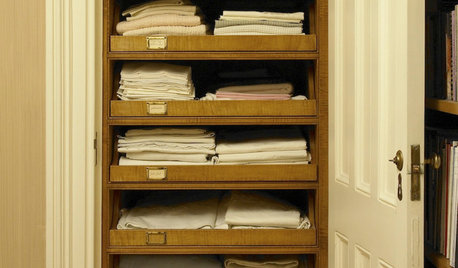
ORGANIZINGHow Much Stuff Is Enough?
Play the numbers game to streamline your belongings, for a neater home and a less-stressed you
Full Story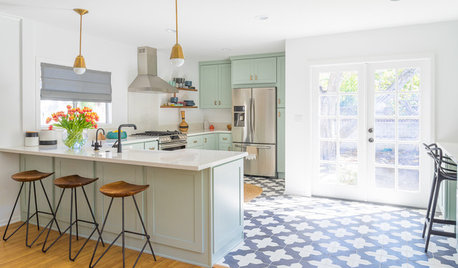
KITCHEN DESIGNTrending Now: 25 Kitchen Photos Houzzers Can’t Get Enough Of
Use the kitchens that have been added to the most ideabooks in the last few months to inspire your dream project
Full Story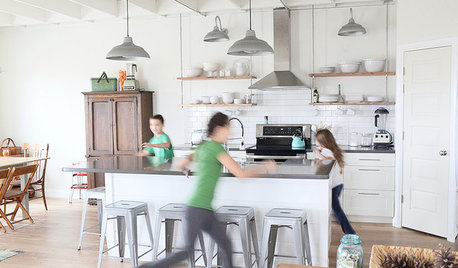
MOST POPULARA Fine Mess: How to Have a Clean-Enough Home Over Summer Break
Don't have an 'I'd rather be cleaning' bumper sticker? To keep your home bearably tidy when the kids are around more, try these strategies
Full Story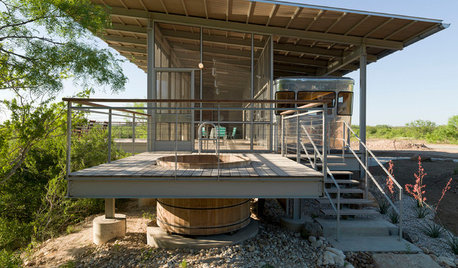
LIFERetirement Reinvention: Boomers Plot Their Next Big Move
Choosing a place to settle in for the golden years? You're not alone. Where boomers are going and what it might look like
Full Story
HOUZZ TOURSWe Can Dream: Rural Retirement Home a Haven of Beauty and Tranquillity
A retired couple builds a spacious Japanese-inspired indoor-outdoor sanctuary to enjoy with extended family
Full Story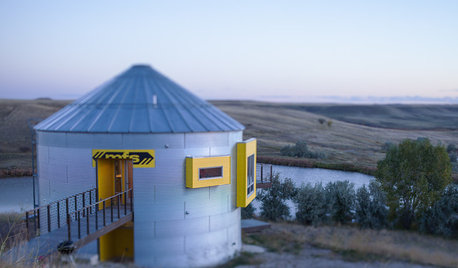
HOUZZ TOURSHouzz Tour: Prairie Grain Bin Turned Bucolic Retirement Home
An agrarian structure and a big dream combine in this one-of-a-kind home that celebrates 250 acres of Montana grasslands
Full Story
REMODELING GUIDESWhen Retirement Came Early, a Couple Headed for the Hills
A Seattle pair turn their part-time home into a full-time one, remodeling it to gain views and help it stand up to snow, sun and wind
Full Story
HOUZZ TOURSMy Houzz: A Condo of Delightful Curiosities in Louisville
Gorgeous vintage finds and eclectic repurposed pieces shine in this dream renovated retirement home
Full Story
ARCHITECTUREHouzz Tour: A Salvaged Airplane Becomes a Soaring Hillside Home
Made from a retired 747, this modern house in Malibu shows how architecturally stunning reuse can be
Full Story
BEDROOMSRoom of the Day: Contemporary Condo Style for a New Master Bedroom
Downsizing space didn’t mean skimping on style for this newly retired Canadian couple
Full Story


Jim Mat